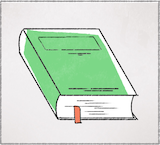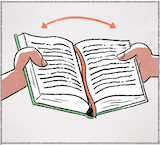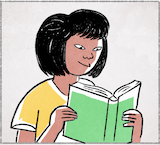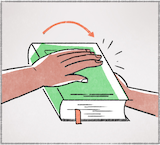





นี้คืออี่หยัง อันนี้เป็นหนังสือ หนังสือเหล้มบักใหญ่หนึ่ง เหล้มสีเขียว หนาตึ่บเอาโลด
หนังสือมีไว้เฮ็ดหญัง หนังสือกะมีไว้ถ้าอ่าน เอาไว้ถ้าให้ความลู้ ขั้นเฮาเปิดเบิ่งหนังสืออันนั้น หลือว่าเปิดอ่านหนังสืออันนั้น เฮากะสิมีความลู้เกี่ยวกับความลู้ที่มันมีอยู่ในหนังสืออันนั้น
แล้วหนังสือกะมีแนวขั้นหนังสือพ้อม สีแดงๆ นั้นหละ เอาไว้ถ้าขั้นหนังสือ สมมุดว่าเฮาอ่านฮอดหน้านั้นๆ แล้ว เฮากะเอาแนวขั้นหนังสือขั้นไว้ ญามแบบว่าเฮาเซาอ่านแล้ว หลือว่าอ่านฮอดหน้านั้น แล้วเฮาสิพักเบก หลือว่าบ่อยากอ่านอีกแล้ว สิกับมาอ่านมื้อใหม่ เฮากะเอาแนวขั้นหนังสือนั้นมาขั้นไว้ แล้วพอมื้อหลังเฮามาอ่าน เฮากะสิฮู้แล้วว่า เฮาฮอดหม้องนั้นแล้ว เฮาต้องอ่านต่อหม้องนั้น แล้วเฮากะเปิดหม้องที่เฮาขั้นไว้นั้นหละ เอาแนวขั้นสีแดงๆ นั้นหละขั้นไว้ อันนี้กะคือขั้นแนวขั้นหนังสือ
13
เขากำลังเฮ็ดหญัง เขากำลังสิเอาหนังสือ
เอาหนังสืออยู่ใส กะเอาหนังสืออยู่ในซั้นวางหนังสือ
เขาสิเอาหนังสือไปหญัง เขากะอาดสิเอาหนังสือนั้นไปอ่าน เขากะเลยสิเอาหนังสือนั้นไป
หนังสืออยู่เทิงซั้นนั้นมีจักเหล้ม กะมีหลายเหล้มอยู่ มีห้าหกเหล้มพุ้นหนะ เทิงสีซมพู สีเขียว สีแดง สีเหลียง สีฟ้า หลายเหล้มอี่หลีวางเฮียงกันอยู่
14
เขากำลังเฮ็ดหญัง เขากำลังเปิดหนังสือ
เขาเปิดหนังสือเฮ็ดหญัง เขากะอาดสิอ่านหนังสือ เขากะเลยเปิดหนังสือ
เขาเปิดหนังสือจักเหล้ม เปิดเหล้มเดียว เปิดเหล้มเดียวข้อหล้อ เหล้มสีเขียว มือข้างหนึ่งกะเปิดไปอีกฝั่งหนึ่ง มือข้างหนึ่งกะเปิดไปอีกฝั่งหนึ่ง
แล้วอี่หยังอยู่ตงกางหนังสือนั้นสีแดงๆ อันนั้นกะเป็นแนวขั้นหนังสือ เป็นแนวขั้นหนังสือเพื่อที่ว่าสิเอาไว้ถ้าขั้นหนังสือ ขั้นหน้านั้น ขั้นหน้านี้
15
เขากำลังเฮ็ดหญัง เขากำลังอ่านหนังสือ
เขาอ่านหนังสืออยู่กับใผ เขาอ่านหนังสืออยู่พุเดียวของเขานั้นหละ เขาอ่านอยู่พุเดียว
แล้วเขาอ่านหนังสืออยู่ใส เขาอาดสิอ่านอยู่โลงเลียน อาดสิอ่านอยู่บ้าน หลือว่าอาดสิอ่านอยู่ห้องสะหมุดกะได้
เขาอ่านหนังสือจักเหล้ม เขากะอาดสิอ่านหนังสือเหล้มเดียว เพาะว่าเฮาเห็นเขาจับหนังสืออยู่เหล้มเดียว บ่ได้มีหลายเหล้ม
16
เขากำลังเฮ็ดหญัง เขากำลังปิดหนังสือ เขาพุนี้กำลังปิดหนังสือ
เขาปิดหนังสือเฮ็ดหญัง เขากะอาดสิบ่อ่านแล้ว หลือว่าอาดสิเซาอ่านแล้ว เขากะเลยปิดหนังสือไว้ เพื่อที่ว่าอาดสิเอาไปเก็บ หลือว่าเอาไปเมี้ยนหม้องที่เขาเอามา
17
เขากำลังเฮ็ดหญัง เขากำลังเอาหนังสือไปเก็บไว้ซั้นวางหนังสือ
เป็นหญังเขาคือเอาหนังสือไปเก็บไว้ซั้นวางหนังสือ กะเพื่อว่าสิให้มันเป็นเลียบล้อย เป็นละเบียบเลียบล้อย เขากะเลยสิเอาไปเก็บไว้ซั้นวางหนังสือ เพื่อที่ว่าสิให้มันเบิ่งงาม หลือว่าเป็นละเบียบคือเก่า
ขั้นเขาเอาหนังสือออกมาแล้ว บ่ไปเก็บไว้หม้องเก่า คนอื่นที่เขาสิมาเบิ่ง หลือว่าอาดสิเอามาอ่าน เขากะหาเหล้มนั้นบ่พ้อ หาเหล้มนี้บ่พ้อ เพาะว่าคนที่เอาไปอ่านนั้น บ่มาเก็บไว้หม้องเก่า เอาไปอ่านแล้วกะเอาไปถิ้มไว้หม้องอื่น เอาไปวางไว้หม้องอื่น คนอื่นกะบ่สามาดหาเหล้มหนังสือนี้ได้
Link to overview page
Link to dictionary
| Isaan | Pronunciation | Tones | Thai | English/Notes |
|---|---|---|---|---|
| นี้ | ni: | HF | นี้ | 1. this 2. here |
| คือ | khʉ: | HR | คือ | 1. to be, to resemble, like, as 2. why {บักหล้าคือบ่เก็บโต่ะแน่ = [addressing a young boy] Why haven't you cleared the table?} |
| อี่หยัง | i:-yaŋ | H-M | อะไร | 1. what {นี้คืออี่หยัง = What is this?} {มื้อนี้เจ้าเฮ็ดอี่หยัง = What are you doing today?} {กินเข้างายกับอี่หยัง = What did you have for breakfast?} 2. something, anything, (in negations) nothing {บ่ต้องเฮ็ดอี่หยังอีกเลยนอกจากใส่ปุย = [we] don't need to do anything besides adding fertilizer} |
| อัน | an | M | อัน | 1. thing, object 2. general clf. for objects |
| เป็น | pen | M | เป็น | 1. to be, to exist 2. to be able to 3. to suffer, sth. happens to 4. เป็นหญัง[...]คือ in initial position: why? {เป็นหญังเขากะคือแปงฟัน = Why is he brushing his teeth?} {เป็นหญังเคี่ยงบินมันคือสิตก = Why is the airplane falling down?} |
| หนังสือ | naŋ-sʉ: | M-M | หนังสือ | 1. book {เลียนหนังสือ = to study} 2. text {เขียนหนังสือ = to write sth.} Notes: sentence-final: often with rising tone which is likely a Thai influence |
| เหล้ม | lem | LF | เล่ม | clf. for books, notebooks |
| บัก | bak | M | 1. intensifier before adjectives {ปาโตบักใหญ่ = a (very) large fish} 2. prefix in front of fruits and vegetables {บักแตงโม = watermelon} 3. can be used as a reference for a male person of the same or younger age {บักอันนี้ = this lad} |
|
| ใหญ่ | ɲai | H | ใหญ่ | large, big |
| หนึ่ง | nʉŋ | H | หนึ่ง | 1. one 2. after adjective: intensifier {บักคักหนึ่ง = very much} {อันบักใหญ่หนึ่ง = very large}, or attenuates the meaning {กะดาดมันแผ่นน้อยๆ หนึ่ง = the piece of paper is [relatively] small} |
| สี | si: | M | สี | 1. color 2. colored pencil, crayon |
| เขียว | khi:ao | M | เขียว | green |
| หนา | na: | M | หนา | thick |
| ตึ่บ | tʉp | H | หนา | 1. dense, thick 2. used for emphasis as in ... ปึ่บ ... ตึ่บ 3. onomatopoeic: sound of someone walking |
| เอาโลด | ao-lo:t | M-HF | เอาเลย, ทำเลย, จริงๆ | in final position: intensifier {โตส่ำกะทะเอาโลด = [a fish] as large as the pan!} {เกียบเต็มถ้วยเอาโลด = the bowl is almost full!} {ทะนาคานมันสิไปตั้งไว้อยู่ซู่หม้องเอาโลด = banks are everywhere!} |
| มี | mi: | HR | มี | 1. to have 2. there is |
| ไว้ | wai | HF | ไว้ | 1. to keep, to put, to place, to retain, to save, to reserve {เขาเอาหัวของเขาไว้ใส = Where does she put her head?} {หมาสิเลี้ยงไว้บ้าน = dogs are kept/raised in the house} {ไก่เลี้ยงไว้ในคอก = chicken are kept/raised in a coop} {หน้ามันบังไว้ = the face is covered/not visible} {เขาเอาโทละสับวางไว้หู = he holds the phone to his ear} 2. for {นาลิกาปุกมีไว้เฮ็ดหญัง = What is an alarm clock for?} {หม้อเอาไว้เฮ็ดแนวกิน = a pot is used to make food} {ก่องเอาไว้เฮ็ดหญัง ก่องเอาไว้ใส่ของ = What is the box for? It's for putting in stuff.} Notes: see also ไว้ถ้า |
| เฮ็ด | het | H | ทำ | to do, to make |
| หญัง | ɲaŋ | M | อะไร, เป็นหญัง = ทำไม | 1. what {เขากำลังเฮ็ดหญัง = What is he doing?} {ธูปเอาไว้เฮ็ดหญัง = What are incense sticks for?} 2. something, anything, (nothing) 3. เป็นหญัง[...]คือ in initial position: why {เป็นหญังเขาคือใส่บักพิกลงไปในกวยเตียว = Why is he putting chili in [his] noodle soup?} {เป็นหญังหน้าต่างมันคือเปิด = Why is the window open?} {เป็นหญังมันคือมีควนไฟ = Why is there smoke?} |
| กะ | ga | M | ก็ | 1. then, consequently 2. also |
| ไว้ถ้า | wai-tha: | HF-LF | usually in a positive statement or answer: is for, is used for, has the purpose of {กะทะมีไว้ถ้าทอด = a pan is for frying} {น้ำบักนาวมีไว้ถ้าปุงอาหาน = lime juice is used to season food} {ปากกามีไว้ถ้าเขียน = a pen is for writing} {กะเทียมเอาไว้ถ้าเฮ็ดแนวกิน = garlic is used to make food} {ขาเอาไว้ถ้าญ่าง = legs are for walking} {เกิบเอาไว้ถ้าใส่ = shoes are for wearing} Notes: see also ไว้ |
|
| อ่าน | a:n | H | อ่าน | to read |
| เอา | ao | M | เอา | to take, to give {เขากำลังเอาก่องไปซั่ง = he's taking the boxes to weigh them} {หมอกำลังเอายาให้คนป่วยกิน = the doctor is giving medicine to the patient} {เอาไว้ถ้า = is for, is used for, has the purpose of} |
| ให้ | hai | LF | ให้ | 1. to give {หมอกำลังเอายาให้คนป่วยกิน = the doctor is giving the patient medicine} 2. for 3. to allow, to be allowed |
| ความลู้ | khwa:m-lu: | HR-HF | ความรู้ | knowledge Notes: see also ความฮู้ |
| ขั้น | khan | LF | เมื่อ | when, if |
| เฮา | hao | HR | เรา | 1. personal pronoun: we 2. personal pronoun: I |
| เปิด | pə:t | M | เปิด | 1. to open {เปิดหน้าต่าง = to open the window} {เปิดปะตู = to open the door} 2. to start, to switch on {เปิดไฟ = to switch on the light} {เปิดแอ = to switch on the A/C} |
| เบิ่ง | bəŋ | H | ดู | 1. to look at, to see, to watch {เบิ่งโทละทัด = to watch TV} {เบิ่งหนัง = to watch a movie} 2. to guess {เบิ่งซงแล้ว ... = [I] guess / from what it looks like ...} |
| นั้น | nan | HF | นั้น | that, there |
| หลือ | lʉ: | M | หรือ | or |
| ว่า | wa: | H | ว่า | 1. that, as {คำว่า X = the word X} 2. to say |
| สิ | si | M | จะ | future tense auxiliary {เขากำลังสิตื่น = he's about to wake up} {สิไปตะหลาด = [I'm] going to the market} |
| เกี่ยวกับ | gi:ao-gap | H-M | เกี่ยวกับ | about, regarding, pertaining to |
| ที่ | thi: | H | ที่ | 1. that, which {คนที่ยืนอยู่ฝั่งขวา = the person which is standing on the right = the person standing on the right} {เว้าคำที่บ่สุพาบ = to speak words which are impolite = to speak impolitely} 2. for ordinal numbers {ที่สาม = third} |
| มัน | man | HR | มัน | it (also used to refer to people) |
| อยู่ | yu: | H | อยู่ | 1. to be (located) at 2. yet, still 3. auxiliary indicating continuous or progressive action {ทอดปาอยู่ในกะทะ = (in the process of) frying a fish in the pan} {แม่กำลังเมี้ยนเฮียนอยู่ = mother is cleaning/tidying up the house} |
| ใน | nai | HR | ใน | in, within |
| แล้ว | lɛ:o | HF | แล้ว | 1. finished 2. already 3. and then, and next (especially แล้วกะ) 4. auxiliary for past tense |
| แนวขั้น | nɛ:o-khan | HR-LF | ที่คั่นหนังสือ | bookmark |
| พ้อม | phɔ:m | HF | พร้อม | at the same time, also, too {มีตะเว็นพ้อม = the sun's out, too} {กะทะมีด้ามพ้อม = the pan has also a handle} |
| แดง | dɛ:ŋ | M | แดง | red |
| นั้นหละ | nan-la | HF-M | นั่นแหละ | auxiliary for emphasis at the end of a phrase |
| ขั้น | khan | LF | คั่น | to partition, to separate |
| สมมุด | som-mut | M-H | สมมุติ | to assume, to suppose |
| ฮอด | hɔ:t | HF | ถึง | 1. to arrive, to attain {ฮอดจุดหมายปายทาง = (airplane, train etc.) to arrive at one's destination} {มันทันได้ฮอดหกโมงอยู่ = it's not yet 6 o'clock} 2. to, at {ผมญาวฮอดบ่าไหล่เอาโลด = long hair down to the shoulders} 3. about {บ่ได้เว้าฮอด = [I] haven't talked about [this]} {คนที่เฮาเว้าฮอดวั่งหั้นหละ = the person we've just talked about} |
| หน้า | na: | LF | หน้า | 1. front {ปะตูหน้า = front door} 2. face {เขากำลังล้างหน้า = he's washing his face} 3. auxiliary: conditional tense {เขาหน้าสิเป็นพุบ่าวพุสาวกัน = they are probably groom and bride} {กะหน้าสิส้มอยู่ = it's likely to be sour} 4. season {หน้าฮ้อน = hot season} 5. page 6. clf. for pages {เฮาอ่านฮอดหน้านั้นแล้ว = we've read until this page} |
| ญาม | ɲa:m | HR | ยาม | 1. period of time {ญามมื้อเซ้า = morning} {ญามเที่ยง = noon} 2. when, while {ญามทอด ต้องใซ้น้ำมันพ้อม = one needs to use oil when frying} {ญามสิออกไปข้างนอกกะต้องใส่เกิบ = when one goes out, ones has to wear shoes} |
| แบบ | bɛ:p | LF | แบบ | 1. example, model, kind 2. style, form, pattern, design |
| เซา | sao | HR | จบ | 1. to stop, to be finished {น้ำมันเซาไหลแล้ว = the water has stopped flowing} {ฝนเซาตกแล้ว = it has stopped raining} {มันสิเซาเสียงดัง = (phone) it stops ringing loudly} 2. to prevent, to hinder 3. to rest {เซาเมี่ยย = to rest} |
| พัก | phak | H | พัก | to rest, to take a break, to pause |
| เบก | be:k | LF | เบรก | to take a break |
| บ่ | bɔ: | H | ไม่ | 1. no, not 2. question particle, transforming a statement into a question Notes: spelling exception in line with common usage on social media |
| อยาก | ya:k | LF | อยาก | to want, to wish |
| อีก | i:k | LF | อีก | 1. more, again 2. other, another |
| กับ | gap | M | กลับ | to return, (to go/come) back {กะสิตอบกับมาว่า ... = and will answer back: ...} {กับบ้าน = to return home} |
| มา | ma: | HR | มา | 1. to come 2. auxiliary expressing action towards the present or focal time {กะคุเฮ็ดมาจากอี่หยัง = What is the bucket made of?} {แล้วเขากะเก็บเงินจากพุนั้นมา = and then she takes the money of that person} |
| มื้อ | mʉ: | HF | วัน | day |
| ใหม่ | mai | H | ใหม่ | new |
| พอ | phɔ: | HR | พอ | 1. just when, just after, as soon as 2. enough, adequate |
| มื้อหลัง | mʉ:-laŋ | HF-M | วันหลัง | another day, following day, later, in the future |
| ฮู้ | hu: | HF | รู้ | 1. to know 2. to understand Notes: equivalent to ลู้ |
| หม้อง | mɔŋ | LF | ที่, แห่ง, บริเวณ | 1. place, area {หลายที่หลายหม้อง = in many places} {หม้องใดหม้องหนึ่ง = some place} 2. clf. for places |
| ต้อง | tɔŋ | HF | ต้อง | to have to, must |
| ต่อ | tɔ: | H | ต่อ | 1. next 2. to join, to connect, to link Notes: see also ต่อไป, ต่อไปนี้ |
| เขา | khao | M | เขา | personal pronoun: he, she |
| กำลัง | gam-laŋ | M-HR | กำลัง | auxiliary indicating continuous or progressive action |
| ใส | sai | M | (ที่)ไหน | 1. where? {สิไปใส = Where are [you] going?} {มาแต่ใส = Where are [you] coming from?} {กะทะอยู่ใส = Where's the pan?} 2. somewhere, anywhere {ใสกะได้ = anywhere, wherever you like} |
| ซั้นวางหนังสือ | san-wa:ŋ-naŋ-sʉ: | HF-HR-M-M | ชั้นวางหนังสือ | bookshelf |
| ไป | pai | M | ไป | 1. to go 2. auxiliary indicating action extending into the future |
| อาด | a:t | LF | อาจ | 1. might, may, will 2. likely |
| เลย | lə:i | HR | เลย | 1. futher on, beyond, past {เข็มน้อยเลยเลขสิบสองไป = the minute hand has passed number twelve} 2. too much 3. at all 4. definitively 5. completely, utterly |
| เทิง | thə:ŋ | HR | บน | 1. on, on top of, at, in {เทิงโต่ะ = at/on the table} {กบมันนั่งอยู่เทิงใบบัว = the frog is sitting on the lotus leaf} {เทิงท้องฟ้า = in the sky} {มันแล่นอยู่เทิงลาง = [the train] runs on rails} {มีคนนั่งอยู่เทิงลดสามล้อสามคน = there are three people sitting in the tuk tuk} 2. up, upward Notes: pronunciation: also realized as ทัง |
| ซั้น | san | HF | ชั้น | 1. floor, shelf, step of a staircase {ซั้นเก็บเสี้ยผ้า = clothes shelf} {ซั้นวางหนังสือ = book shelf} 2. level, grade, class {ซั้นมอสี่ = secondary school grade four} 3. layer |
| จัก | jak | M | จัก | 1. answer to a question: [I] don't know, don't know exactly, [I'm] not sure {พุซายคนนี้เขาเถ้าไป่ จัก จักเถ้าหลือบ่เถ้า เบิ่งบ่ค่อยออก = Is this man here already old? I don't know. I can't see clearly whether he's old or not.} {เขาเว้ากันอยู่ใส จักคือกัน = Where are they talking? I don't know either.} 2. exact(ly), what exactly {จักต้มอี่หยังกะบ่ฮู้ = I don't know what (exactly) he is cooking} {บ่ลู้คือกันจักปาอี่หยัง = I don't know either what kind of fish this is} 3. how much/many? {ต้นไม้มีจักต้น = How many trees are there?} {ตอนนี้จักโมงแล้ว = What time is it now?} {มือของเฮานี้สิมีจักนิ้ว = How many fingers do our hands have?} 4. a bit, a little bit {จักหน่อย/จักหน่อยหนึ่ง = a bit, a little bit} |
| หลาย | la:i | M | เยอะ, มาก | many, much, very |
| ห้า | ha: | LF | ห้า | five |
| หก | hok | M | หก | six |
| พุ้นหนะ | phun-na | HF-H | นู่นแหละ | auxiliary for emphasis at the end of a phrase Notes: variant of พุ้นหละ |
| เทิง | thə:ŋ | HR | ทั้ง | 1. up to, all, all of, the whole of, altogether {เขาใส่กางเกงขาสั้นเทิงสองคน = both are wearing short trousers} {เขาเป็นพ่อของลูกเทิงสามคนนี้ = he's the father of these three [children] here} 2. เทิง ... เทิง ...: both ... and ..., ... as well as ... {เทิงมีใบพ้อม เทิงมีเหลียนพ้อม = there are notes as well as coins} Notes: pronunciation: also realized as ทัง |
| ซมพู | som-phu: | HR-HR | ชมพู | pink |
| เหลียง | li:aŋ | M | เหลือง | yellow |
| ฟ้า | fa: | HF | ฟ้า | 1. sky {เคี่ยงบินมันกำลังบินขึ้นฟ้า = the airplane is taking off into the sky} 2. color: blue |
| อี่หลี | i:-li: | H-M | จริง | intensifier: really Notes: pronunciation: also realized as อี่หลิ |
| วาง | wa:ŋ | HR | วาง | to place, to set/put down {โทละสับ/phone: วางสาย = to hang up} {มีเกิบวางอยู่ในก่อง = there are shoes in the box} {มือข้างหนึ่งเขาวางอยู่เทิงโต่ะ = he's put one of his hands on the table} |
| เฮียง | hi:aŋ | HR | เรียง | 1. to line up, to stand in a row {มีพุซายสามคนยืนเฮียงกันอยู่ = three men are standing in a row} 2. to arrange Notes: see also เลียง |
| กัน | gan | M | กัน | mutual, each other, with another, together {เขากำลังนั่งเว้ากัน = they're sitting and talking} {เขาสองคนฮักกัน = they love each other} {ปาสองโตนี้ ใหญ่ห่างกันหลายบ่ = These two fish here, are they very different in size (from each other)?} {ต่างกัน = to be different (from each other)} {ก่องอันไหนหนักกว่ากัน = Which box is heavier (than the other(s))?} |
| เดียว | di:ao | M | เดียว | only, alone, single |
| ข้อหล้อ | khɔ:-lɔ: | LF-LF | เท่านั้น, ขนาดนั้น, น้อยๆ | only {ต้นไม้มีต้นเดียว ต้นเดียวข้อหล้อ = there's one tree, only one tree} {มีบ้านหลังเดียวข้อหล้อ = there's only one house} |
| มือ | mʉ: | HR | มือ | 1. hand 2. front leg/paw (e.g., of a cat) |
| ข้าง | kha:ŋ | LF | ข้าง | 1. side {มีหูจับสองข้าง = there are handles on both sides} 2. next to {วางอยู่ข้างๆ ก่องใบใหญ่ = it's placed next to the large box} {เขายืนอยู่ข้างๆ อีกพุหนึ่ง = he's standing next to another person} 3. clf. for body parts which come in pairs (eyes, ears, legs etc.) {เขามีตาสองข้าง = she has two eyes} |
| ฝั่ง | faŋ | H | ฝั่ง | 1. side 2. river/canal bank, shore |
| ตง | toŋ | M | ตรง | 1. at 2. to be precise at, to be exact {ห้าโมงตง = exactly five o'clock} 3. straight |
| กาง | ga:ŋ | M | กลาง | middle, center |
| เพื่อที่ | phʉ:a-thi: | H-H | เพื่อที่ | in order to, so that Notes: the vowel เอือ is likely to be a Thai loan |
| กับ | gap | M | กับ | 1. and {ลุงกับป้า = uncle and aunt} {กวยเตียวหมูกับกวยเตียวไก่ = noodle soup with pork and noodle soup with chicken} 2. with, to {ค้ายๆ กับคำว่า ... = similar to the word ...} 3. prefix in front of foods {กับเข้า = side dishes eaten with rice} {เขากินกับกวยเตียว = he's eating noodle soup} |
| ใผ | phai | M | ใคร | 1. who {พุซายคนนี้เป็นใผ = Who's this boy?} 2. somebody, someone, anybody, with negative: nobody {บ่มีใผอยู่หนี้จักคนเลย = there's not a single person here} |
| พุเดียว | phu-di:ao | H-M | คนเดียว | 1. alone, by oneself {เขากำลังยืนอยู่พุเดียว = she's standing by herself} {เขานั่งอยู่พุเดียว = he's sitting by himself} 2. one person |
| ของ | khɔ:ŋ | M | ของ | of, belonging to |
| โลงเลียน | lo:ŋ-li:an | HR-HR | โรงเรียน | school |
| บ้าน | ba:n | HF | บ้าน | 1. house, home 2. village (also used as a prefix before the name of a village) 3. home country, home region {บ้านเฮาเฮ็ดเข้าจั่งใด = How do we plant rice in Isaan/Thailand?} |
| ห้องสะหมุด | hɔŋ-sa-mut | LF-M-M | ห้องสมุด | library |
| ได้ | dai | HF | ได้ | 1. can 2. to get, to obtain 3. before verb: indicating past tense 4. บ่ได้ + verb: not |
| เพาะว่า | phɔ-wa: | H-H | เพราะว่า | because |
| เห็น | hen | M | เห็น | to see |
| จับ | jap | M | จับ | 1. to grasp, to hold {เขาจับมือกัน = they're holding hands} {เขายืนจับไอติมอยู่ = she's standing, holding an ice cream} 2. to catch, to arrest {จับพุล้าย = to arrest a criminal} |
| ปิด | pit | M | ปิด | 1. to close {ปิดปะตู = to close the door} {ปิดก่อกน้ำ = to close the tap} 2. to finish, to switch off {ปิดไฟ = to switch off the light} {ปิดวิทะยุ = to switch off the radio} |
| พุ | phu | H | ผู้ | 1. person 2. clf. for people {พุหญิงพุหนึ่ง พุซายพุหนึ่ง = a woman, a man} {ซู่พุซู่คน = everybody} {พุหนึ่งโตจ่อยๆ พุหนึ่งโตบักอ้วนหนึ่ง = one person is slim, the other is fat} Notes: pronunciation: also realized as พู่- |
| เก็บ | gep | M | เก็บ | 1. to collect, to gather, to accumulate, to pick/harvest {เก็บเงิน = to save money} {in a restaurant: เก็บเงิน = to get the bill} {เก็บน้ำ = to collect and store water} {เก็บผัก = to harvest vegetables} 2. to keep 3. to take in, to put away, to tidy up |
| เมี้ยน | mi:an | HF | เก็บ, ทำความสะอาด | 1. to tidy, to put in order 2. to clean |
| เพื่อ | phʉ:a | H | เพื่อ | for Notes: the vowel เอือ is likely to be a Thai loan; pronunciation: also realized as เพี่ย |
| เลียบล้อย | li:ap-lɔ:i | HF-HF | เรียบร้อย | neat, tidy, refined, well-behaved, in good order |
| ละเบียบ | la-bi:ap | H-LF | ระเบียบ | 1. order, system, proper arrangement 2. orderly, tidy, neat |
| งาม | ŋa:m | HR | สวย | beautiful, handsome, splendid |
| คือเก่า | khʉ:-gao | HR-H | as before | |
| ออก | ɔ:k | LF | ออก | 1. to go out, to leave 2. out |
| เก่า | gao | H | เก่า | old |
| คน | khon | HR | คน | person, people |
| อื่น | ʉ:n | H | อื่น | other |
| หา | ha: | M | หา | to look for, to find |
| พ้อ | phɔ: | HF | พบ, เจอ | 1. to meet {จั่งพ้อกันใหม่ = See you again!} {คนที่หัวกะเคยพ้อกัน = someone [we've] just met} {ขั้นพ้ออาจานคนใด ต้อง ... = whenever you meet a teacher, you need to ...} 2. to encounter, to find {เขาหาเหล้มนั้นบ่พ้อ = he doesn't find that book} |
| ถิ้ม | thim | LF | ทิ้ง | 1. to leave, to abandon 2. to throw away, to discard 3. to drop, to let drop |
| สามาด | sa:-ma:t | M-HF | สามารถ | can, to be able |